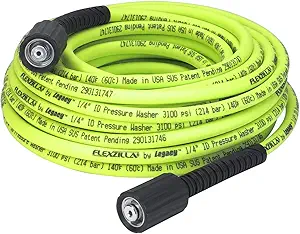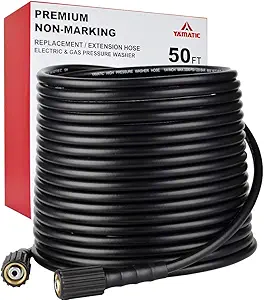The Ultimate Buying Guide for Pressure Washer Hoses: Types, Features, Prices, and Tips
Overview
A pressure washer hose is an essential component of any pressure washing setup. It connects the pressure washer to the spray gun and allows you to direct high-pressure water onto surfaces to clean them effectively. When shopping for a pressure washer hose, there are several factors to consider, including the type of hose, its length, material, and fittings. In this buying guide, we'll cover all the key considerations and features you need to know before making a purchase.
Types
There are several types of pressure washer hoses available, including:
1. Standard hoses - these are the most common type of pressure washer hose, made from durable materials like rubber, PVC, or polyurethane. They are available in various lengths and are compatible with most pressure washer brands.
2. Extension hoses - these are add-on hoses that allow you to extend the reach of your pressure washer. They're ideal for cleaning hard-to-reach areas like rooftops or gutters.
3. Replacement hoses - if your pressure washer hose is damaged or worn out, you can replace it with a new one. Replacement hoses are available in different lengths and materials.
4. Non-marring hoses - these hoses are designed to prevent scratches and scuffs on delicate surfaces like cars or boats.
5. Kink-resistant hoses - these hoses are reinforced with wire mesh or other materials to prevent kinking and tangling.
Key Considerations
When choosing a pressure washer hose, consider the following factors:
1. Length - choose a hose that's long enough to reach the areas you need to clean without having to move the pressure washer around too much.
2. Material - look for hoses made from durable materials like rubber or polyurethane that can withstand high-pressure water.
3. Fittings - make sure the hose has the right fittings to connect to your pressure washer and spray gun.
4. Maximum PSI rating - choose a hose with a PSI rating that's compatible with your pressure washer.
Features
Here are some of the key features to look for in a pressure washer hose:
1. Braided construction - hoses with braided construction are more durable and less likely to burst or leak.
2. Threaded fittings - hoses with threaded fittings are more secure and less likely to come loose during use.
3. Quick-connect fittings - hoses with quick-connect fittings make it easy to attach and detach the hose from the pressure washer and spray gun.
4. Flexible - look for hoses that are flexible and easy to maneuver, even in tight spaces.
Prices
The price of a pressure washer hose can vary widely depending on the length, material, and features. Standard hoses typically range from $20 to $50, while extension hoses can cost $30 to $100 or more. Replacement hoses are usually in the $20 to $50 range.
Tips
Here are some tips to help you get the most out of your pressure washer hose:
1. Always check the hose for damage before use.
2. Avoid leaving the hose in direct sunlight or extreme temperatures.
3. Store the hose properly when not in use to prevent kinks and tangling.
4. Use the right nozzle for the job to avoid damaging delicate surfaces.
FAQs
Q: Can I use any pressure washer hose with my pressure washer?
A: No, you need to choose a hose that's compatible with your pressure washer's fittings and maximum PSI rating.
Q: How long should my pressure washer hose be?
A: It depends on the size of the area you need to clean. Choose a hose that's long enough to reach all the areas you need to clean without having to move the pressure washer too much.
Q: How do I know if my pressure washer hose is damaged?
A: Look for signs of wear and tear, including cracks, leaks, or bulges. If you notice any damage, replace the hose before using it again.
Q: Can I repair a damaged pressure washer hose?
A: It's usually best to replace the hose rather than trying to repair it, as a damaged hose can be dangerous to use.
Conclusion
In conclusion, choosing the right pressure washer hose is essential for getting the most out of your pressure washer. Consider the type of hose, length, material, fittings, and features when making your purchase, and follow our tips for proper use and maintenance. With the right hose, you'll be able to tackle any cleaning job with ease.














